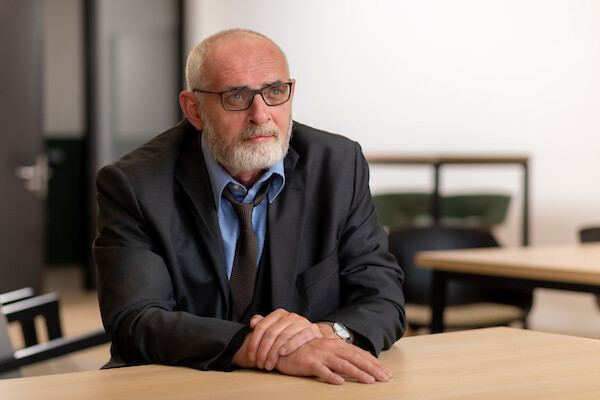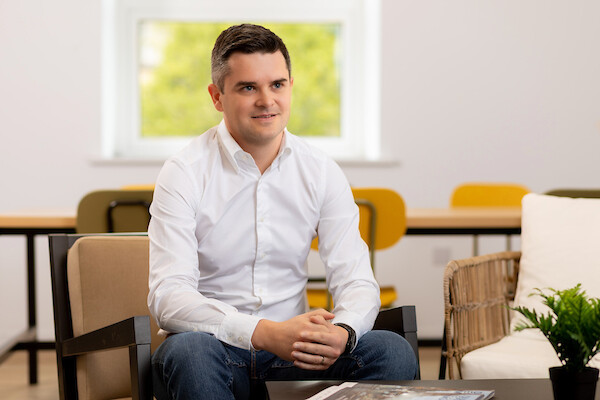Investing in the most ambitious founders who are building tomorrow
We are a relationship driven early stage VC investor. We invest in and form close partnerships with the founders we back.
Our investment approach
We make initial investments at Seed to Series A stage in highly ambitious, born global Irish software and medtech companies. We are hands-on and support teams across key strategic areas to accelerate growth.
In addition to providing institutional investment at an early stage, we reserve significant capital for following on in subsequent rounds. We go the journey with founders.
Our current fund is highly active, investing in some of Ireland’s most scalable and transformative tech start-ups at seed stage and beyond. The fund is backed by a number of leading tech entrepreneurs and business leaders as well as Enterprise Ireland. We are investing in 7+ new start-ups every year, with the ability to invest up to €3m in an individual company through multiple investment rounds to drive growth in international markets.
Get in touch below if you think your start-up might be a fit for Furthr VC.
Furthr VC In Numbers
Investment Criteria
- Product/Service: B2B SaaS, Medtech
- Location: Republic of Ireland
- Stage: Seed to Series A stage
- Sector: Sector agnostic
Meet the team in charge of the fund
Richard Watson
Colm O'Sullivan
Working at Furthr - what our VC team says

Portfolio Company Spotlight
Investment Portfolio
Common FAQs about Venture Capital
Venture Capital (VC) is a type of private equity financing that is provided by venture capital firms or funds to startups, early-stage, and emerging companies that have been deemed to have high growth potential. This kind of financing is often riskier as it involves investing in businesses that may not be fully established yet, hence the term “venture” capital.
To bring this into context with the Irish VC market. Ireland has a vibrant and rapidly growing VC scene. Much of this growth has been driven by a strong startup culture and a supportive government policy framework. Ireland has a range of venture capital firms that invest in promising startups, from seed-stage through to growth-stage investments.
Some of the prominent VC firms in Ireland include Furthr VC, Frontline Ventures, Delta Partners, ACT Venture Capital, and Atlantic Bridge. These firms typically invest in Irish startups across a range of sectors such as technology, life sciences, and fintech.
What makes the Irish VC market particularly interesting is its strong connections to international markets. Many Irish VC firms co-invest with international counterparts, providing Irish startups with valuable access to global markets. Furthermore, Ireland itself is seen as an attractive location for international VC firms looking for investment opportunities in Europe due to its strong economy, favourable tax regime, and skilled workforce.
Also worth noting is the role of the Irish state in promoting venture capital through the Irish Venture Capital Association (IVCA) and Enterprise Ireland. These bodies not only provide funding but also offer guidance and support to both investors and startups alike.
Venture Capital is a crucial part of the business ecosystem that helps high-potential startups grow and scale. The Irish VC market is particularly dynamic, with strong local and international linkages that provide promising opportunities for investors and startups alike.
Ireland enjoys a robust and dynamic VC ecosystem, supported by a mix of government-backed initiatives and private funds. There are several key venture capital schemes that play a significant role in this landscape. Away from the help, Furthr can provide for your business.
Enterprise Ireland (EI): This is the government organization responsible for the development and growth of Irish enterprises in world markets. They provide both direct and indirect funding to businesses. One of their most notable funds is the Seed & Venture Capital Scheme, which aims to increase the availability of risk capital for startups.
Irish Venture Capital Association (IVCA): This is an association that represents the local VC community in Ireland. Its members are firms and individuals who professionally manage pooled investment funds that are available for direct investment into private businesses.
Development Capital Scheme: This is another government-backed initiative aimed at boosting funding for mid-sized companies in Ireland. It offers funding amounts between €2m and €10m, providing a substantial boost for companies looking to expand.
Innovation Fund Ireland: This is a government initiative designed to attract global VC fund managers to Ireland. The fund aims to stimulate job creation and economic activity by investing in innovative sectors.
Business Angels Partnership: This scheme is a joint initiative between Enterprise Ireland, InterTradeIreland, and the Irish Business Innovation Centres. It matches private investors (aka ‘business angels’) with pre-screened investment opportunities in startup, early-stage, and developing businesses.
Seed Capital Scheme: This scheme provides a refund of income tax paid over the previous six years to investors who invest in certain startup companies. It’s intended to stimulate job creation and encourage investment into Irish startups.
Each of these schemes is designed to address different stages of business growth and development – from startups seeking initial seed funding to more established companies seeking funds for expansion.
-
- Access to Capital: One of the most significant benefits of VC is that it provides startups with the financial resources they need to grow and develop their products or services. In Ireland, this is particularly crucial due to the costs associated with starting a business.
- Mentorship and Expertise: VC firms often provide more than just funding; they also bring invaluable industry knowledge and mentorship. They can offer strategic guidance, help with networking, and provide access to potential clients or partners.
- Credibility and Reputation: Being backed by a reputable VC can add credibility to your startup. This is especially true in Ireland, where VC firms like Furthr VC are known for their successful portfolios.
-
- Loss of Control: When you accept VC funding, you’re often giving away a portion of your company’s equity. This means that major decisions will now require the approval of your investors.
- Pressure to Deliver: VC firms are looking for a return on their investment, which can put enormous pressure on startups to perform quickly.
- Risk of Failure: The hard truth is that many startups fail, even those backed by venture capital. While Irish VC firms tend to be supportive, failure can still mean significant financial loss and a potentially damaged reputation.
At its most simple, venture capital (VC) funding is a form of financing that investors provide to startup companies and small businesses that are believed to have long-term growth potential. These investments usually come from well-off investors, investment banks, and any other financial institutions.
The Irish venture capital market has been gaining significant traction over the years. Ireland has become an attractive hub for startups, particularly in the tech sector. The vibrant ecosystem here offers a conducive environment for businesses to grow and thrive.
In Ireland, companies usually seek out VC funding when they have a unique business model with substantial growth potential but require significant funding to scale operations or enter new markets. In return for the capital investment, these companies often offer equity in their business.
Irish VC firms are known for their focus on value creation. They aren’t just passive investors; they often provide mentorship and strategic guidance to the startups they invest in. This might include helping a company refine its business model, offering advice on penetrating new markets, or even aiding in talent acquisition.
Recent data suggests that Irish startups raised about €1.13 billion in venture capital funding in 2020 alone, a clear sign of the robust VC culture in the country.
But it’s not just local investors who are pouring money into Irish startups. International investors have also taken notice of Ireland’s thriving startup scene. The fact that international funding accounted for 55% of all Irish VC funding rounds in 2020 underscores this point.
In conclusion, while venture capital funding does have a higher risk it also can have a high reward. It plays a crucial role in driving innovation and entrepreneurship in the Irish market. For startups with a visionary idea and the ambition to scale, it’s one of the best ways to secure the necessary funds.
Firstly, let’s start with an overview: both venture capitalists (VCs) and angel investors provide funding for businesses, but they do so in distinctly different ways.
Angel investors are typically individuals who have a significant amount of personal wealth and an interest in investing in startups or small businesses, often at their early stages. They offer financial backing in exchange for equity, or sometimes a convertible note which can turn into equity. In Ireland, there’s a vibrant community of angel investors who are always on the lookout for exciting new businesses to put their money into.
Now, let’s move on to venture capitalists. Venture capital firms are professional groups that manage pooled funds from various investors to put into businesses. These firms often invest in a wider range of stages – from early to later stages of business growth – and their investments usually are larger than those of angel investors due to the collective nature of their funding pool. Ireland has a thriving VC market, with several well-established firms like Atlantic Bridge, Frontline Ventures, and ACT Venture Capital.
The main differences? Well, VCs typically invest larger amounts but in fewer businesses, and they often expect a higher return on their investment because they’re risking more money. Angel investors, on the other hand, might invest smaller amounts across a broader range of businesses, spreading their risk. They’re often more involved at a personal level too – many angels are successful entrepreneurs themselves who want to give something back by nurturing new startups.
In terms of the Irish market specifically, both forms of investment play a key role in supporting the growth of innovative Irish startups. The Irish Venture Capital Association reports that Irish VCs have invested over €1 billion in local businesses over the past decade, while the Halo Business Angel Network (HBAN) is actively involved in connecting angel investors with promising Irish startups.
So, while both venture capital firms and angel investors play a vital role in business investment, they do so in different ways and at different stages of a company’s growth.
Remember, whether you’re seeking an angel investor or venture capital for your business, the most important thing is to find partners who share your vision and can provide not just funding, but also valuable guidance and support.
Venture capital is a form of private equity financing that is provided by venture capital firms or funds to startups, early-stage, and emerging companies that have been deemed to have high growth potential. So, when it comes to raising venture capital funding in Ireland, you’ll need to do a bit of groundwork first.
Refine Your Business Plan: Venture capitalists want to invest in companies that show significant potential for high returns. So, your business plan should clearly illustrate your company’s value proposition, market size, competitive advantage, and revenue model. If you’re not already profitable, your business plan should at least show a clear path towards profitability.
Create a Strong Management Team: A capable and experienced team is often more important than even the product or service itself in the eyes of VCs. Venture capitalists want assurance that their investment will be managed by competent, dedicated professionals who can navigate challenges and take the company to the next level.
Network: This is particularly crucial in Ireland’s relatively small VC market. Attend entrepreneurship events, join business associations, and engage with the startup ecosystem in Ireland. Free Furthr Pitch events is a great place to start networking.
Identify Potential Investors: Not every VC firm is right for every business. Research potential investors carefully to see if they have experience in your industry and if their investment criteria align with your business. Enterprise Ireland, for instance, has a list of active VC firms in Ireland.
Prepare a Pitch: Your pitch should be concise yet comprehensive, covering everything from your business idea to your financial projections. Think of it as a compelling story about why your company will succeed and how the VC firm will benefit from this success.
Negotiate Terms: If a VC firm is interested in investing, you’ll need to negotiate terms. This includes the investment amount, the equity stake the VC firm will receive, and other conditions of the investment.
Follow Legal Procedures: Once terms are agreed upon, you’ll go through a due diligence process. This is where everything you’ve claimed about your business will be verified. Legal documents will then be drafted, reviewed, and signed.
Use the Funds Wisely: Once the funds are received, it’s crucial that they are used to meet the growth projections you’ve promised. Regular updates should also be provided to investors about how their funds are being used.
Remember that raising venture capital is not the end goal but a means to an end: growing your business.
Venture Capital (VC) is essentially an investment made into a small or startup company with the potential to grow. The goal is to provide these companies with the financial fuel they need to accelerate their growth and become successful in their respective markets.
Why is venture capital so important? Here are some of the points below:
Fosters Innovation: One of the most significant aspects of VC is that it tends to focus on innovative businesses that traditional financial institutions might deem too risky. In Ireland, this has led to a surge in creative and disruptive startups across sectors like technology, biotech and green energy among others.
Job Creation: VC-backed companies can scale quickly, creating new jobs and contributing to economic growth. According to a 2019 report by the Irish Venture Capital Association, VC-backed companies in Ireland created over 20,000 jobs, highlighting the critical role VC plays in the Irish job market.
Economic Growth: When these startups succeed, they contribute to the economy by paying taxes, creating jobs, and potentially even becoming exporters. The same report mentioned above also estimated that Irish VC-backed companies contributed over €4 billion directly to the Irish economy.
Attracting Foreign Investment: A vibrant domestic VC market can also attract foreign investors looking for promising investment opportunities. Ireland has been successful in this regard with major global VC firms like Sequoia Capital and Kleiner Perkins investing in Irish startups.
Risk Sharing: Venture capital firms share the risk with entrepreneurs. They provide much-needed capital, but they also bring industry knowledge, strategic guidance and networks to the table. This support can be crucial for startups navigating the choppy waters of growth.
Exit Opportunities: Finally, a healthy VC market also helps create a more vibrant ecosystem for exits (when investors sell their stake in a company), whether through acquisitions or going public. This not only provides investors with returns but also often injects more capital back into the ecosystem, creating a virtuous cycle of investment and growth.
In conclusion, venture capital plays a pivotal role in nurturing the start-up ecosystem, creating jobs, and driving economic growth.
In the world of venture capital, an “exit” is a term you’ll come across quite often. Simply put, an exit strategy is the plan for a venture capitalist (VC) to get their initial investment back (plus hopefully a hefty profit) from a startup or business they’ve invested in.
This usually happens when the company is sold to another business (trade sale), or when it goes public (Initial Public Offering or IPO), both events enabling the VC to sell their shares. In some unfortunate cases, it could also happen when the startup goes bankrupt, which is obviously not the ideal scenario for any VC.
In Ireland, venture capital plays a critical role in the growth of innovative companies. Many Irish startups rely on VC funding to scale their operations and boost their growth. And just like any other VC market, exits are an important part of the Irish VC landscape as well.
Historically, trade sales have been the most common exit strategy in the Irish VC market. These are often made to larger international companies looking to acquire smaller innovative startups to expand their own operations or tap into new technologies or market segments.
IPOs, while less common, are another form of exit. However, going public requires a company to be of a substantial size and demonstrate consistent profitability, making this option less viable for many startups.
The goal for VCs (whether in Ireland or elsewhere) is to exit their investment within around 5-10 years with significant profit. However, it’s important to note that not all investments end up being successful and sometimes VCs do lose their money – that’s the risk they take in this high-stakes game.
Firstly, let’s break down what a SAFE is. SAFE stands for Simple Agreement for Future Equity. It was introduced by Y Combinator, a renowned startup accelerator, back in 2013. In essence, a SAFE is a financing contract used by startups to raise funds in their early stages. It provides investors the right to claim future equity in the company, without determining a specific price per share at the time of the initial investment. This means that the investment amount is converted into equity at a future date, typically during a subsequent funding round or an event like an exit or IPO.
Now, how does this apply to the Irish venture capital market? The use of SAFEs within Ireland is relatively new but growing rapidly due to its simplicity and flexibility. The Irish VC market, like many European markets, has traditionally used different forms of convertible notes or priced equity rounds for early-stage investments. However, SAFEs are becoming an increasingly popular alternative.
One of the reasons for this shift is that SAFEs eliminate certain complexities found in traditional financing methods. For example, with convertible notes, there’s the necessity to agree on an interest rate and maturity date. SAFEs do away with these terms making the whole process smoother.
Another reason is that SAFEs are generally more founder-friendly. They allow startups to raise funds without setting a valuation cap which can be beneficial for entrepreneurs who believe their startups have high growth potential.
However, it’s important to note that while SAFEs offer numerous advantages, they also come with risks and challenges. For instance, since SAFEs are not debt instruments, investors don’t have any claim on the company’s assets if things go south. Moreover, since SAFEs are relatively new in Ireland, some legal uncertainties still surround their usage.
In conclusion, a SAFE in venture capital is a financial instrument that provides investors with the right to future equity in a company. Its adoption in the Irish VC market is growing due to its simplicity and founder-friendly nature. However, like any investment tool, it comes with its own set of risks and challenges that need to be carefully considered.







